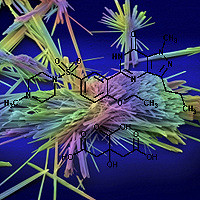Creatine monohydrate is the “original” form of supplementary creatine, and is believed to be the best form of the supplement as it is literally just creatine and a water molecule. Creatine citrate is usually used of you have problems absorbing creatine, while creatine phosphate is used to shorten the metabolic pathway for the conversion of creatine to phosphocreatine in the muscles.
This supplement comes in a few different forms, namely as a powder, in capsules and as a serum. It is generally believed that the powdered form is easiest to use and allows you maximum control over your dosage. It is also thought that serums are not the best form of the supplement as the water in them converts the creatine into creatinine, the waste product of creatine. This renders the creatine useless to the consumer and makes these serums disappointing in their results.
It is not recommended that creatine be used as a dietary supplement from the start of training; rather it is used when you reach the first plateau in your results. Plateaus occur when, despite altering exercise routines and taking in more calories in your diet, or training more intensely, the outcome of your training remains the same. Creatine should be used to allow you to achieve above your previous best results and allow you to train at 110% of your previous efforts. As a word of warning, creatine should not be supplemented into the diet without it being used up by the body as it can cause bowel irritability, diarrhoea and dehydration (causes muscles to absorb more water, removing it from the blood stream).
When using creatine as a dietary supplement, you should take it mixed with a fruit juice such as grape juice, as the simple sugars in the juice cause the body to release insulin, which directs more creatine to the muscles and gets it there quicker. Creatine also attracts water to the muscles, so you should also be drinking plenty of water. There is no firm evidence that it is most beneficial to take creatine before or after training, so by tracking your results and experimenting with dosage and what you take the supplement with, you should find the combination and regime that suits you best.
Creatine is an aid that should be used to help you achieve the results you want, but should never be taken instead of a healthy diet full of the nutrients and carbohydrates necessary for weight gain training.. Start with small doses of 2-5 grams a day and work your way gradually to 20-25 grams a day. Cycling your creatine intake (e.g.. take it for two months then stop for one month) is also recommended to prevent you becoming dependent on creatine for good training results. Remember, make it work for you; don’t work for it!
http://www.nrgstop.com
Over 18 years experience in various capacities of marketing, customer service and event management in public and private sectors.

